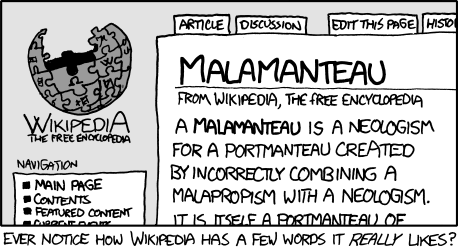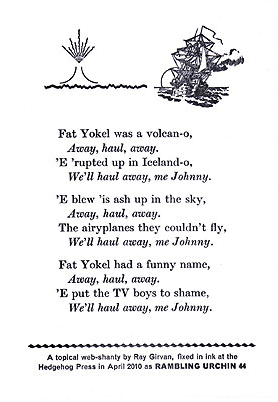22 arguments

The title text (visible on mouseover as usual): "The article has twenty-three citations, one of which is an obscure manuscript from the 1490's and the other twenty-two are arguments on LanguageLog."
Read the rest of this entry »
It's back… or is it?
Jean-Paul Nerrière's "Globish" hits the media again, this time because Robert McCrum is using his space at the Guardian to push a new book with the same title. According to McCrum, "the globalisation of English, and English literature, law, money and values, is the cultural revolution of my generation" ("How English erased its roots to become the global tongue of the 21st Century", 5/9/2010).
The last time I posted about Globish ("Another day, another reprinted press release", 4/24/2005), I complained that the International Herald Tribune uncritically reprinted a nearly contentless press release promoting Nerrière's books and other products. McCrum's book excerpt in the Guardian is quite different — it's chock full of what looks to me like a lot of mutually incompatible information, opinion, and analysis, most of it old news being passed off as the new new thing.
Read the rest of this entry »
Train wreck crash blossom
If you knew the background, you could see this one coming: "Welcome Replaces Costly for Honduras", NYT 5/10/2010:
Read the rest of this entry »
Braised Beancrud
From Jim Gordon:
My wife and I visited Boston a week ago, and after dian xin at the China Pearl (which is very little changed from 1973-74), we went to the shade across the street to plot our course for touring. The photo below is of a sign in the window there:
Read the rest of this entry »
Searching 43 stylebooks
On John McIntyre's blog You Don't Say, I recently learned about a site where you can search 43 different stylebooks at once. These run the gamut from the recommendations of the American Anthropological Association to those of the World Health Organization, by way of The Economist Style Guide, Jack Lynch's Guide to Grammar and Style, the Oregon Department of Human Services, and The Videogame Style Guide and Reference Manual.
The site is OnlineStylebooks.com, and as John notes, "This should help you to learn how to live with inconsistency". Which is ironic, since the purpose of stylebooks is to help achieve consistency.
Read the rest of this entry »
Objects all the way down to the turtles
James Iry, who ought to know, has written "A Brief, Incomplete, and Mostly Wrong History of Programming Languages". I don't believe that there's anything similar for natural languages, although John Cowan's "Essentialist Explanations" offers a wealth of raw material.
Read the rest of this entry »
More on a#n vs. an#
Here, with additional context, are the audio clips from yesterday's post "The phonetics of a#n vs. an# juncture":
| 1. | |
| 2. | |
| 3. | |
| 4. |
Read the rest of this entry »
From LL comment to artisanal publication
 Back of April 27, I linked to Aspen Swartz's volcano-themed sea chanty ("Eyjafjallajökull FTW"), and in the comments, Ray Girvan suggested that in the tradition of sailor-style anglicization that transformed the Bellerophon into the Billy Ruffian, Eyjafjallajökull should become "Fat Yokel". Ray embodied that suggestion in four sample verses.
Back of April 27, I linked to Aspen Swartz's volcano-themed sea chanty ("Eyjafjallajökull FTW"), and in the comments, Ray Girvan suggested that in the tradition of sailor-style anglicization that transformed the Bellerophon into the Billy Ruffian, Eyjafjallajökull should become "Fat Yokel". Ray embodied that suggestion in four sample verses.
Now it seems that Ray's creation has joined William Blake, H.V. Morton, and Rudyard Kipling on a one-page postcard-sized serial publication called The Rambling Urchin ("Dispatches from Adanaland", JSBlog, 5/7/2010).
The phonetics of a#n vs. an# juncture
Geoff Pullum's recent post "An aim or a name?" stimulated a surprisingly lively discussion of juncture in English. This morning, I thought I'd encourage this interest in phonetics by posting a random sample of relevant real-world examples.
The distinction between "a name" and "an aim" turned out to hard to find — the 25 million words of conversational (telephone) speech that I searched had plenty of instances of "a name", but only one instance of "an aim". So I picked a similar case where both sides of the opposition are represented by dozens of tokens: "a nice" vs. "an ice", in contexts like "a nice guy" or "a nice one", vs. "an ice storm" or "an ice cream sundae".
Here are four random selections from this little collection — see if you can identify them:
| 1. | |
| 2. | |
| 3. | |
| 4. |
Read the rest of this entry »
An aim or a name?
In a meeting the other day I heard a colleague say something that was either the first of these or the second:
A good test of whether a course is coherent in its content is whether we can give it an aim.
A good test of whether a course is coherent in its content is whether we can give it a name.
Read the rest of this entry »
"PR" changes its meaning overnight
A funny thing happened to the abbreviation "PR" overnight. When I went to bed last night "PR" typically meant "public relations". When I woke up it didn't.
Read the rest of this entry »
Permalink Comments off
Bilingualism Required at the Supreme Court of Canada
Canada's House of Commons has passed bill C-232, which requires that justices of the Supreme Court of Canada understand both English and French without the assistance of an interpreter. This will become law unless vetoed by the Senate or denied royal assent by the Governor General (which is exceedingly unlikely). Amazingly, the bill is a private member's bill introduced by a member of the New Democratic Party, which holds only 36 of 308 seats.
Read the rest of this entry »

